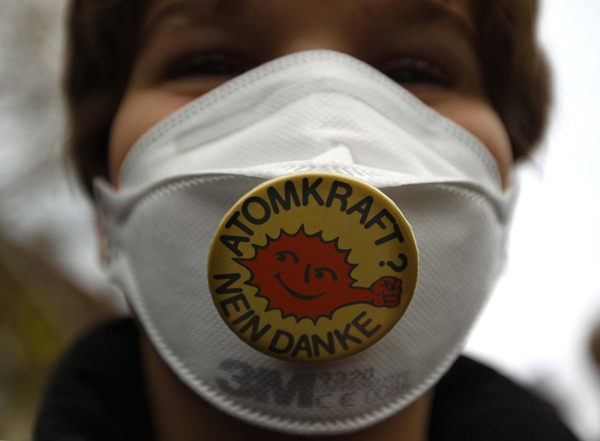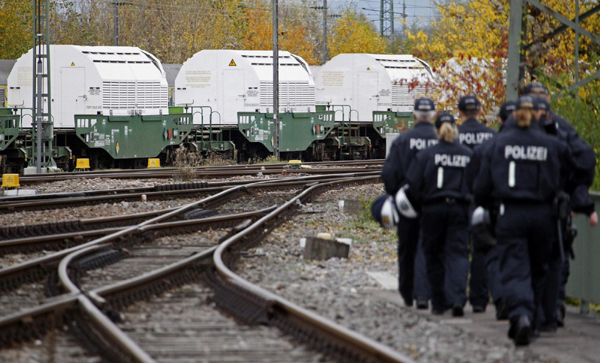Science and Health
Mass German anti-nuclear rally against waste shipment
(Agencies)
Updated: 2010-11-06 22:47
 |
Large Medium Small |
|
 |
|
An anti-nuclear protestor takes part in a demonstration against the transport of Castor nuclear waste containers in Berg near the German French border in south-west Germany, November 6, 2010. 'Atomkraft? Nein Danke' means 'Nuclear power? No thanks.' [Photo/Agencies]
|
|
 |
|
German policemen walk next to a train transporting CASTOR nuclear waste containers in the railway station of Kehl, on the German-French border November 6, 2010. [Photo/Agencies] |
DANNENBERG, Germany - Tens of thousands of protesters took part in one of the largest anti-nuclear rallies in years on Saturday as the first shipment of waste in two years was slowed by activists on its way from France back to Germany.
The transport has become a tense political issue this year due to anger over Chancellor Angela Merkel's decision to extend the lifespan of Germany's 17 nuclear power plants in the face of overwhelming public opposition.
The waste transported on Saturday originated in Germany and was reprocessed at the French nuclear group Areva's processing plant at La Hague for storage in a site in the northern German town of Gorleben.
Merkel urged those taking part in the rally to refrain from committing criminal acts while attempting to stop the convoy of 11 train cars carrying 154 tonnes of waste.
The train was held up for hours by an earlier demonstration near the German-French border when thousands of activists blocked the tracks. The waste shipment is expected to arrive in Gorleben, near the central city of Dannenberg, on Sunday.
At the mass rally in Dannenberg, thousands listened to speeches and music while others made plans to at least temporarily stop the convoy before it reaches Gorleben.
"Merkel provoked society by extending the lifespan of nuclear power and this is the people's answer," said Juergen Trittin, a leader in the Greens party.
Organisers estimated 50,000 took part in the rally, but police said there were more than 10,000.
Merkel's government has slumped in popularity due in large part to its decision to extend nuclear power by about 12 years beyond the original shut-down set for 2021. Germany gets 23 percent of its energy from nuclear power.
Demonstrators had to march across soggy fields and roads after days of heavy rain to reach the rally but spirits were high.
"We're here to show we're not going to accept the government's nuclear policies," said Giselher Kuehn, riding on one of some 600 farm tractors taking party in the rally. Pensioner Elke Hinrichsmeyr, 71, from the town of Buchholz, added: "We're horrified that this government wants to extend the use of nuclear power. They've ignored the will of the people."
"We're against nuclear power because the waste will remain radioactive for thousands of years," said Renate Komm, 72.
Anti-nuclear activists have often clashed with police in pitched battles in the past and a police force of some 20,000 was on hand to secure the shipment.
Scenes of violence in previous transports have contributed to Germany's strong anti-nuclear mood.
Protesters fear the depot at Gorleben, built as an interim storage site, could become permanent. Greenpeace says the site, in a disused salt mine, would be unsafe over the long term.